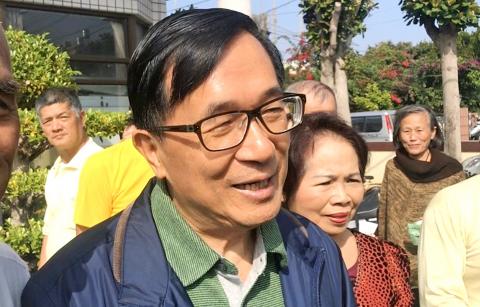Former president Chen Shui-bian (陳水扁), spiritual head of the Taiwan Action Party Alliance (TAPA), announced yesterday that he is withdrawing from politics and bid farewell to his supporters.
Chen, popularly known as “A-bian,” served as Taiwan’s president from 2000 to 2008.
He made the announcement in a statement after the party failed to win any seats in Saturday’s legislative elections.

Photo: Yen Hung-chun, Taipei Times
“I could not sleep last night and engaged in deep reflection,” Chen said.
“I fought the battle, but as the gardener of this small tree [TAPA], I feel it is beyond my ability to water, tend and watch it grow anymore,” he said.
“I am resigning, and would like to thank everyone for their support and votes, as well as those who have accompanied me from the very beginning to today,” Chen said.
TAPA, created by Chen with the backing of supporters of Taiwanese independence, was launched in Taipei on Aug. 18 last year.
The party advocates independence and seeks Taiwan’s entry into the UN.
In a video shown at the party’s launch, Chen said he believed that TAPA could secure 1 million votes in the legislative elections and win at least three seats or surpass the 5 percent threshold required for at-large seats.
Chen, embroiled in corruption scandals from his time as president, was first detained incommunicado on Nov. 12, 2008, and released on Dec. 13, 2008, after being charged.
He was detained again on Dec. 30, 2008, for nearly two years and after being sentenced to 20 years in prison on a series of corruption charges, began serving his sentence on Nov. 11, 2010.
Chen has maintained that his incarceration was the result of a political vendetta by the Chinese Nationalist Party (KMT) for his pro-independence views.
He was in prison until January 2015, when he was released on medical parole.
On Nov. 5 last year, Chen had his medical parole extended to Feb. 4 — the 20th time he has received an extension.

Several Chinese Nationalist Party (KMT) officials including Chairman Eric Chu (朱立倫) are to be summoned for questioning and then transferred to prosecutors for holding an illegal assembly in Taipei last night, the Taipei Police said today. Chu and two others hosted an illegal assembly and are to be requested to explain their actions, the Taipei City Police Department's Zhongzheng (中正) First Precinct said, referring to a protest held after Huang Lu Chin-ju (黃呂錦茹), KMT Taipei's chapter director, and several other KMT staffers were questioned for alleged signature forgery in recall petitions against Democratic Progressive Party (DPP) legislators. Taipei prosecutors had filed

Taiwan would welcome the return of Honduras as a diplomatic ally if its next president decides to make such a move, Minister of Foreign Affairs Lin Chia-lung (林佳龍) said yesterday. “Of course, we would welcome Honduras if they want to restore diplomatic ties with Taiwan after their elections,” Lin said at a meeting of the legislature’s Foreign Affairs and National Defense Committee, when asked to comment on statements made by two of the three Honduran presidential candidates during the presidential campaign in the Central American country. Taiwan is paying close attention to the region as a whole in the wake of a

NEW WORLD: Taiwan is pursuing innovative approaches to international relations through economics, trade and values-based diplomacy, the foreign minister said Taiwan would implement a “three-chain strategy” that promotes democratic values in response to US tariffs, Minister of Foreign Affairs Lin Chia-lung (林佳龍) said. Taiwan would aim to create a “global democratic value chain,” seek to capitalize on its position within the first island chain and promote a “non-red supply chain,” Lin was quoted as saying in the ministry’s written report to the Legislative Yuan submitted ahead of the legislature’s Foreign Affairs and National Defense Committee meeting slated for today. The Ministry would also uphold a spirit of mutual beneficial collaboration, maintaining close communication and consultations with Washington to show that Taiwan-US cooperation

Taiwan and the US have begun trade negotiations over tariffs imposed by US President Donald Trump earlier this month, Minister of Foreign Affairs Lin Chia-lung (林佳龍) said in an interview this morning before reporting to the Legislative Yuan’s Foreign Affairs and National Defense Committee. The Taipei Economic and Cultural Representative Office (TECRO), Taiwan’s de facto embassy in the US, has already established communication channels with the US Department of State and the US Trade Representative (USTR), and is engaging in intensive consultations, he said. Points of negotiation include tariffs, non-tariff trade barriers and issues related to investment, procurement and export controls, he